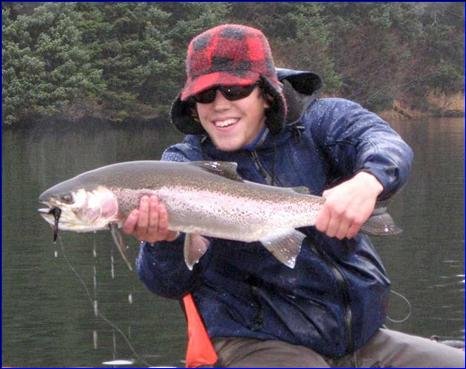Chile.- A project between major salmon farming companies and local communities in Chile is helping foster sustainable aquaculture practices. Efforts to rebuild relations with the communities – like these school kids – are just as important.
The aquaculture industry in Chile has experienced explosive growth in the past decade. Chile is the world’s second-largest producer of farmed salmon and trout after Norway. This phenomenal growth certainly stimulated the local economy, but in part it came about due to unsustainable social and environmental farming practices. Several outbreaks of infection resulting in large numbers of dead farmed fish have impacted local ecosystems and eroded trust between the farms and local communities.
“Rabobank has been working with the main salmon farming companies in Chile since they started in the late 1980s. Our principal goal is to support their development, but in a very sustainable way,” says Erik Heyl, CEO of RaboFinance Chile. “We partnered with the WWF, who have a wealth of knowledge and experience of sustainable practices. Together, we have been extremely successful in advancing this agenda in the past five years.”
Transforming an industry
Today there is an acute awareness in the industry and beyond that practices must change. One of the main drivers of that change has been to encourage Chilean salmon farmers to get official certification by the Aquaculture Stewardship Council. The ASC’s mission is to “transform aquaculture towards environmental sustainability and social responsibility”.
“The time between the program’s launch and its adoption rate was faster than expected,” says Brenda de Swart, Head of Sustainability at RaboFinance Chile. “However a lot of work still needs to be done, with huge challenges on the field of social responsibility. The relationship between salmon companies and local communities is complex. While salmon companies believe they are of major importance for the economic development and employment in the regions in which they are active, the local communities feel that the salmon companies have invaded their territories, exhausting natural resources.”
Responsible Community Guidance
Part of the ASC certification requires that aquaculture firms demonstrate they are “a good neighbor and conscientious citizen”. Changing the mindset and behavior of fish farming companies to be more socially responsible has proved to be a tricky process. To facilitate this stage of the ASC certification, RaboFinance Chile teamed up with the World Wildlife Fund to help create a ‘toolkit’ with the Consensus Building Institute (CBI).
Stay Always Informed
Join our communities to instantly receive the most important news, reports, and analysis from the aquaculture industry.
David Plumb, director of the CBI: “The toolkit was developed in a participatory way working with communities and the industry, to figure out what would work.” The result was a six-stage transformation process. Each stage includes either guidance on how to approach a matter, or concrete tools as to how to facilitate change. “The challenge we face is building constructive relationships with our communities,” says Pablo Hernández of Salmones Camanchaca. “Being able to define six main factors, which we can diagnose internally, and see how we can improve, is very interesting.”
Moving forward
Since the development of the toolkit for companies in late 2017, all parties have been positive about the process. Nine of the 10 aquaculture companies which participated in the original workshops will continue with this initiative at their own costs. Meanwhile, RaboFinance Chile and WWF Chile are currently developing a similar toolkit especially for local communities. This should enable both parties to enter into constructive dialogue with each other.
The three-way communication on this initiative is noteworthy. “Salmon companies were rather suspicious of WWF as it is an NGO,” says De Swart. “Rabobank has longstanding relationships with the Chilean salmon companies. By joining forces, we have opened the doors to the salmon companies for WWF. And partnering with WWF it made it easier for Rabobank to raise the topic of biodiversity and sustainable production with the salmon companies. This fits perfectly within our ‘Banking for Food’ strategy because it contributes directly to stability within the industry and to increased access to salmon as a healthy food.”
Source: Rabobank
Editor at the digital magazine AquaHoy. He holds a degree in Aquaculture Biology from the National University of Santa (UNS) and a Master’s degree in Science and Innovation Management from the Polytechnic University of Valencia, with postgraduate diplomas in Business Innovation and Innovation Management. He possesses extensive experience in the aquaculture and fisheries sector, having led the Fisheries Innovation Unit of the National Program for Innovation in Fisheries and Aquaculture (PNIPA). He has served as a senior consultant in technology watch, an innovation project formulator and advisor, and a lecturer at UNS. He is a member of the Peruvian College of Biologists and was recognized by the World Aquaculture Society (WAS) in 2016 for his contribution to aquaculture.




